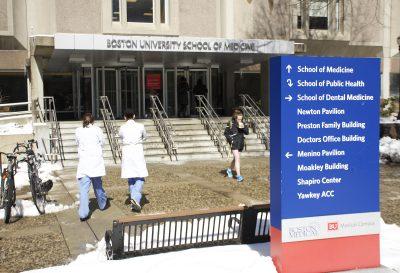
The Chronic Traumatic Encephalopathy Center at Boston University will receive Aaron Hernandez’s brain to add to their research, according to a press release from the Worcester District Attorney Joseph Early Jr.’s office.
Hernandez, 27, was pronounced dead early Wednesday morning after he was found hanging in his cell. The manner of his death was ruled a suicide and the cause of death was asphyxia by hanging, according to the release.
“The office of the Chief Medical Examiner released Mr. Hernandez’s body on Wednesday, but withheld some tissue including his brain until the cause and manner of death was determined,” the DA’s office stated in the release.
Hernandez was serving a life sentence after his 2015 first-degree murder conviction for killing Odin Lloyd in 2013, according to the release.
BU declined to comment, citing that the university did not want to issue a statement without consent from Hernandez’s family.
Karen Pita Loor, a law professor at BU, said that if the CTE Center were to prove that Hernandez had CTE, the court case would become complicated. One reason for this, she said, would be that if Lloyd’s family were to bring the criminal case to civil court, there would be a question of whether Hernandez was under the effects of CTE when he committed the murder.
While Loor said whether Hernandez had CTE at the time of killing does not excuse him for the action, “it might litigate his blameworthiness. In other words, it might be a litigating circumstance that the jury would be able to hear about … this brain condition, ‘I wasn’t fully volitional,’ whatever his behavior was, had something to do with the brain condition he was suffering under.”
Loor said if Hernandez were to be diagnosed with CTE, his estate could sue the National Football League CTE’s connection with his suicide.
Several students at BU said that if Hernandez were to have CTE, it would be good for the field of research, but could complicate the lawsuit.
Bita Naimi, a freshman in the College of Arts and Sciences, said if Hernandez were to have CTE, this could be another valuable piece of information about CTE.
“I think it’s good to do research so there’s evidence,” Naimi said. “If it’s published, then there’s firsthand data and that could affect other people, like the public’s opinion about it because the more research that’s published, the more information there is about it.”
Sean Farrell, a second-year graduate student in the College of Engineering, said that if Hernandez were to have CTE, it doesn’t justify what he allegedly did.
“I feel like searching for something like that to explain it, kind of adds a layer of justification, which is kind of furthering this,” Farrell said. “It kind of makes me wonder that if he wasn’t a successful football player before he did that, would people care to take his brain and look?”
Michaela Brooks, a CAS freshman, said what the CTE Center is doing is great for those suffering with the disease.
“That’s cool because I know Boston University has a great neuro program, so I think it’s cool that BU does this stuff and that it’s making a difference in the world,” Brooks said.






















































































































